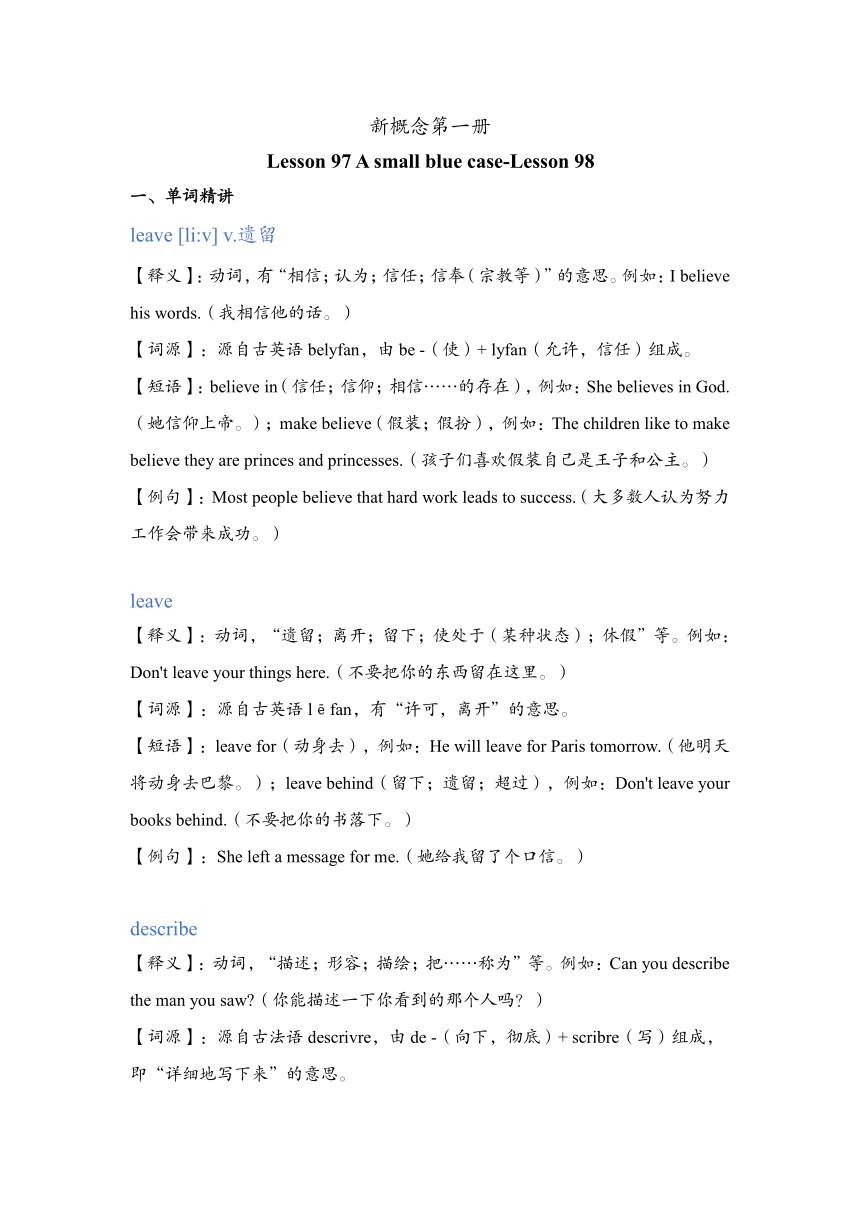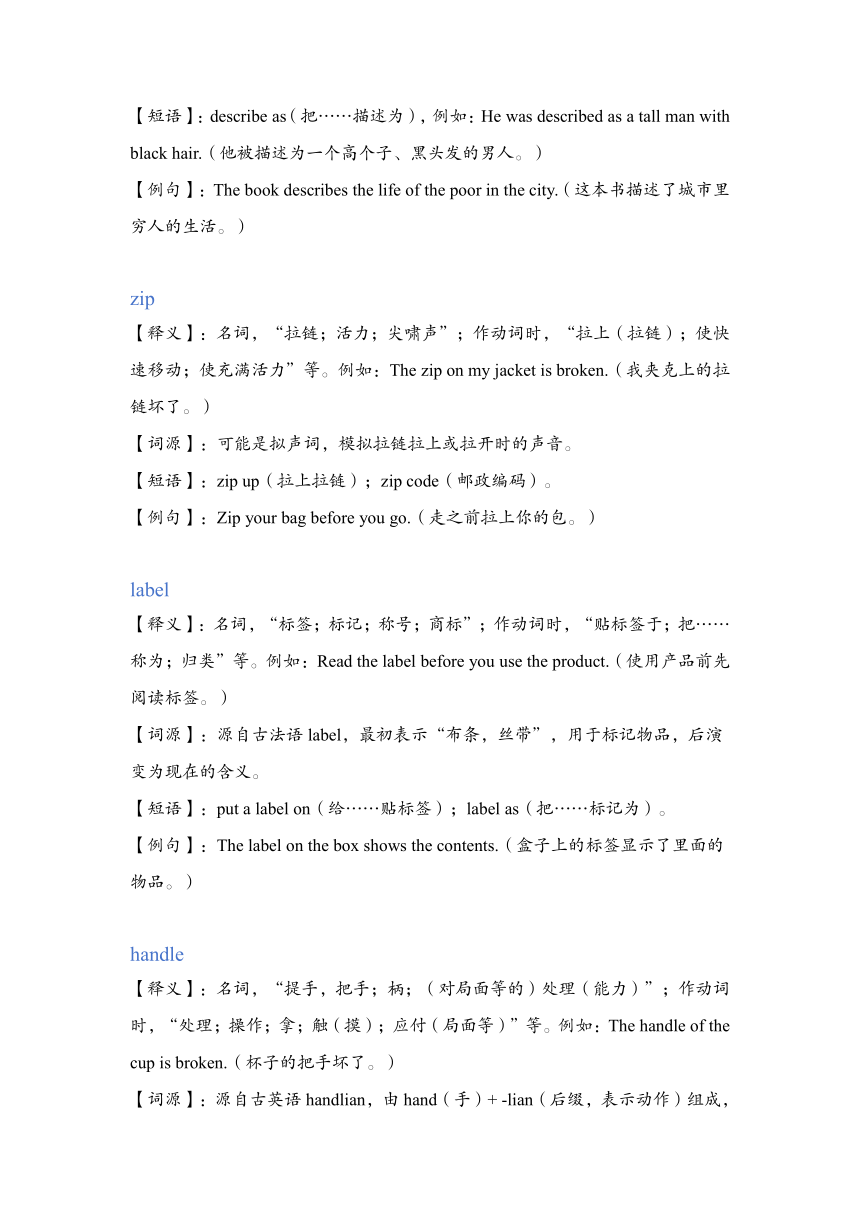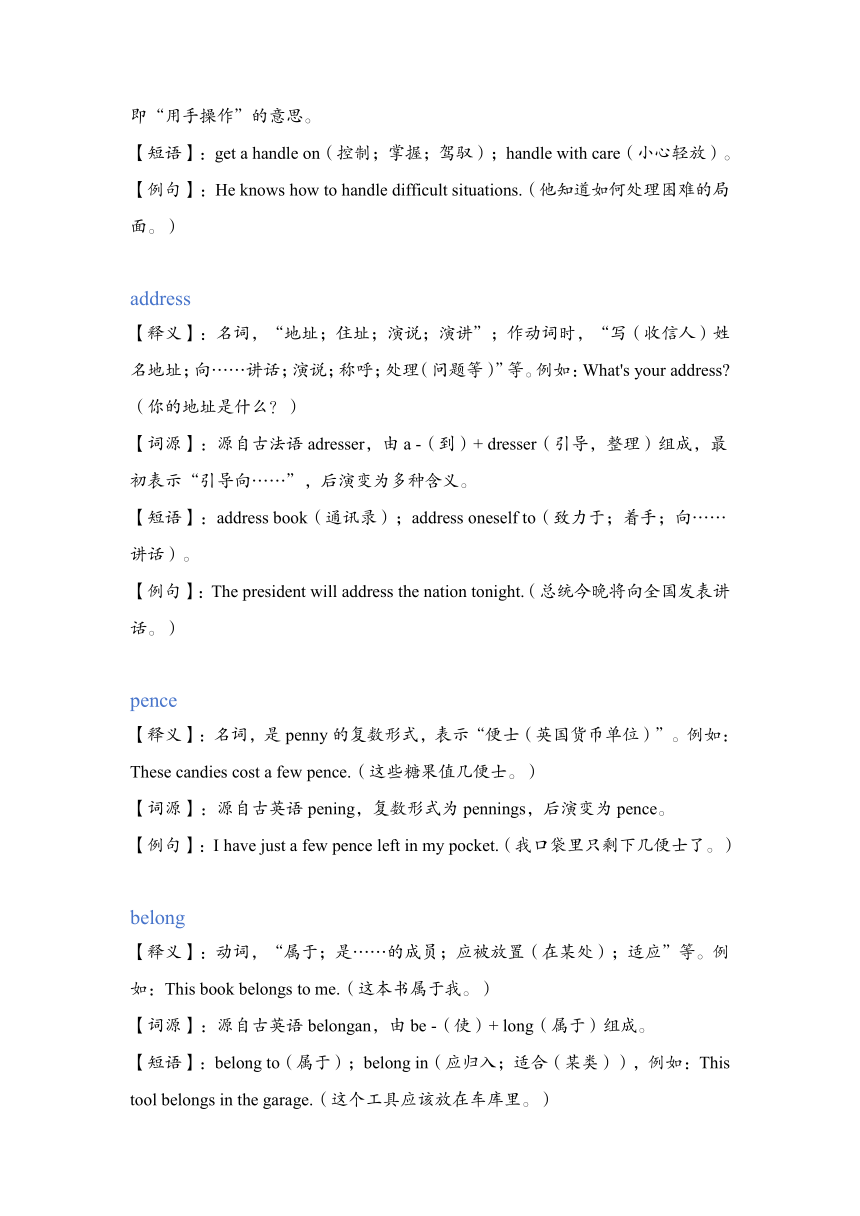新概念第一册Lesson 97 A small blue case-Lesson 98讲义
文档属性
| 名称 | 新概念第一册Lesson 97 A small blue case-Lesson 98讲义 |  | |
| 格式 | docx | ||
| 文件大小 | 128.9KB | ||
| 资源类型 | 教案 | ||
| 版本资源 | 新概念英语 | ||
| 科目 | 英语 | ||
| 更新时间 | 2024-12-03 19:12:51 | ||
图片预览



文档简介
新概念第一册
Lesson 97 A small blue case-Lesson 98
单词精讲
leave [li:v] v.遗留
【释义】:动词,有“相信;认为;信任;信奉(宗教等)”的意思。例如:I believe his words.(我相信他的话。)
【词源】:源自古英语belyfan,由be -(使)+ lyfan(允许,信任)组成。
【短语】:believe in(信任;信仰;相信……的存在),例如:She believes in God.(她信仰上帝。);make believe(假装;假扮),例如:The children like to make believe they are princes and princesses.(孩子们喜欢假装自己是王子和公主。)
【例句】:Most people believe that hard work leads to success.(大多数人认为努力工作会带来成功。)
leave
【释义】:动词,“遗留;离开;留下;使处于(某种状态);休假”等。例如:Don't leave your things here.(不要把你的东西留在这里。)
【词源】:源自古英语lēfan,有“许可,离开”的意思。
【短语】:leave for(动身去),例如:He will leave for Paris tomorrow.(他明天将动身去巴黎。);leave behind(留下;遗留;超过),例如:Don't leave your books behind.(不要把你的书落下。)
【例句】:She left a message for me.(她给我留了个口信。)
describe
【释义】:动词,“描述;形容;描绘;把……称为”等。例如:Can you describe the man you saw (你能描述一下你看到的那个人吗?)
【词源】:源自古法语descrivre,由de -(向下,彻底)+ scribre(写)组成,即“详细地写下来”的意思。
【短语】:describe as(把……描述为),例如:He was described as a tall man with black hair.(他被描述为一个高个子、黑头发的男人。)
【例句】:The book describes the life of the poor in the city.(这本书描述了城市里穷人的生活。)
zip
【释义】:名词,“拉链;活力;尖啸声”;作动词时,“拉上(拉链);使快速移动;使充满活力”等。例如:The zip on my jacket is broken.(我夹克上的拉链坏了。)
【词源】:可能是拟声词,模拟拉链拉上或拉开时的声音。
【短语】:zip up(拉上拉链);zip code(邮政编码)。
【例句】:Zip your bag before you go.(走之前拉上你的包。)
label
【释义】:名词,“标签;标记;称号;商标”;作动词时,“贴标签于;把……称为;归类”等。例如:Read the label before you use the product.(使用产品前先阅读标签。)
【词源】:源自古法语label,最初表示“布条,丝带”,用于标记物品,后演变为现在的含义。
【短语】:put a label on(给……贴标签);label as(把……标记为)。
【例句】:The label on the box shows the contents.(盒子上的标签显示了里面的物品。)
handle
【释义】:名词,“提手,把手;柄;(对局面等的)处理(能力)”;作动词时,“处理;操作;拿;触(摸);应付(局面等)”等。例如:The handle of the cup is broken.(杯子的把手坏了。)
【词源】:源自古英语handlian,由hand(手)+ -lian(后缀,表示动作)组成,即“用手操作”的意思。
【短语】:get a handle on(控制;掌握;驾驭);handle with care(小心轻放)。
【例句】:He knows how to handle difficult situations.(他知道如何处理困难的局面。)
address
【释义】:名词,“地址;住址;演说;演讲”;作动词时,“写(收信人)姓名地址;向……讲话;演说;称呼;处理(问题等)”等。例如:What's your address (你的地址是什么?)
【词源】:源自古法语adresser,由a -(到)+ dresser(引导,整理)组成,最初表示“引导向……”,后演变为多种含义。
【短语】:address book(通讯录);address oneself to(致力于;着手;向……讲话)。
【例句】:The president will address the nation tonight.(总统今晚将向全国发表讲话。)
pence
【释义】:名词,是penny的复数形式,表示“便士(英国货币单位)”。例如:These candies cost a few pence.(这些糖果值几便士。)
【词源】:源自古英语pening,复数形式为pennings,后演变为pence。
【例句】:I have just a few pence left in my pocket.(我口袋里只剩下几便士了。)
belong
【释义】:动词,“属于;是……的成员;应被放置(在某处);适应”等。例如:This book belongs to me.(这本书属于我。)
【词源】:源自古英语belongan,由be -(使)+ long(属于)组成。
【短语】:belong to(属于);belong in(应归入;适合(某类)),例如:This tool belongs in the garage.(这个工具应该放在车库里。)
【例句】:These animals belong to the same species.(这些动物属于同一物种。)
词法
1. leave 的词性辨析:
(1)及物动词:遗忘,落下
I have left my gloves on the bus.我把我的手套落在公车上了。
(2)不及物动词:离开
It's time for us to leave.我们离开的时间到了。
2. 形容词做前置定语的位置:
当同时由多个形容词修饰同一个名词时,遵循“主观判断与评价”+“客观测度”的顺序
There is a big black case under the tree.(先大小,后颜色)
3. 名词性物主代词:相当于名词,具有名词的功能和用法
mine 我的;yours 你的
— Is this car yours 这辆小车是你的车吗?
— Yes, it's mine. (= Yes, it's my car.)是的,它是我的车。
4. 名词性物主代词的应用:
做主语
That isn't my bike. Mine is at school.
做直接宾语:置于动词后面组成动宾结构
I have broken my mirror. Can I borrow yours
做表语
Yes, these keys are mine.
做介词的宾语
That book is in my study, not in yours.
单独使用
Yours, Tom. (一般用于邮件结尾)
重点句型
名词性物主代词
详细梳理:
名词性物主代词
名词性物主代词与形容词性物主代词相对,相当于"形容词性物主代词+名词",所以千万不要在名词性物主代词后面加名词哦!它在句中可以作主语、宾语和表语等。
第一人称 第二人称 第三人称
单数 mine 我的 yours 你的 his/hers/its他/她/它的
复数 ours 我们的 yours 你们的 theirs 他们的
The pen is his brother's, not his.
这支钢笔是他哥哥的,不是他的。
(第一个 his 是形容词性物主代词,第二个 his 是名词性物主代词,相当于 his pen)
It's not my coat.
Mine is on the bed.
这不是我的外套,我的在床上。(作主语)
This room is yours. That's ours.
这是你们的房间,那是我们的。(作表语)
I can't find my eraser. May I use yours
我找不到我的橡皮了,我能用你的吗 (作动词的宾语)
Mary is a friend of mine.
玛丽是我的一个朋友。(作介词的宾语)
★名词性物主代词可以用于"of+名词性物主代词"双重所有格。
四、课文精讲
I left a suitcase on the train to London the other day.
left是leave的过去式,表示“遗忘,丢了”,通常与表示地点的短语连用。
我把我的眼镜忘在教室里了。
I left my glasses in the classroom.
别把伞忘在图书馆里。
Don’t leave your umbrella in the library.
the other day “几天前”一般与过去时连用
the other morning 几天前的上午
the other week 几周前
the other month 几月前
Can you describe it , sir 你能描述一下那个男子么?
It’s hard to describe my feeling with words. 很难用语言描述我的心情。
Can you describe the man
It’s a small blue case and it’s got a zip. There’s a label on the handle with my name and address on it.
“with…+介词短语”表示伴 随情况
A girl is standing in the street with a rose in her hand.
一个女孩手里拿着一支玫瑰站在街上。
Our teacher comes in with some chalk in her hand.
我们老师手里拿着几根粉笔进来了。
What about this one This one’s got a label.
what about…相当于how about… 多用于征求意见
出去散散步怎么样?
What about going out for a walk
这周末去购物怎么样?
How about going shopping this weekend
Let me see it.
= Let me have a look at it.
Let me see. 让我想一想
Lesson 97 A small blue case-Lesson 98
单词精讲
leave [li:v] v.遗留
【释义】:动词,有“相信;认为;信任;信奉(宗教等)”的意思。例如:I believe his words.(我相信他的话。)
【词源】:源自古英语belyfan,由be -(使)+ lyfan(允许,信任)组成。
【短语】:believe in(信任;信仰;相信……的存在),例如:She believes in God.(她信仰上帝。);make believe(假装;假扮),例如:The children like to make believe they are princes and princesses.(孩子们喜欢假装自己是王子和公主。)
【例句】:Most people believe that hard work leads to success.(大多数人认为努力工作会带来成功。)
leave
【释义】:动词,“遗留;离开;留下;使处于(某种状态);休假”等。例如:Don't leave your things here.(不要把你的东西留在这里。)
【词源】:源自古英语lēfan,有“许可,离开”的意思。
【短语】:leave for(动身去),例如:He will leave for Paris tomorrow.(他明天将动身去巴黎。);leave behind(留下;遗留;超过),例如:Don't leave your books behind.(不要把你的书落下。)
【例句】:She left a message for me.(她给我留了个口信。)
describe
【释义】:动词,“描述;形容;描绘;把……称为”等。例如:Can you describe the man you saw (你能描述一下你看到的那个人吗?)
【词源】:源自古法语descrivre,由de -(向下,彻底)+ scribre(写)组成,即“详细地写下来”的意思。
【短语】:describe as(把……描述为),例如:He was described as a tall man with black hair.(他被描述为一个高个子、黑头发的男人。)
【例句】:The book describes the life of the poor in the city.(这本书描述了城市里穷人的生活。)
zip
【释义】:名词,“拉链;活力;尖啸声”;作动词时,“拉上(拉链);使快速移动;使充满活力”等。例如:The zip on my jacket is broken.(我夹克上的拉链坏了。)
【词源】:可能是拟声词,模拟拉链拉上或拉开时的声音。
【短语】:zip up(拉上拉链);zip code(邮政编码)。
【例句】:Zip your bag before you go.(走之前拉上你的包。)
label
【释义】:名词,“标签;标记;称号;商标”;作动词时,“贴标签于;把……称为;归类”等。例如:Read the label before you use the product.(使用产品前先阅读标签。)
【词源】:源自古法语label,最初表示“布条,丝带”,用于标记物品,后演变为现在的含义。
【短语】:put a label on(给……贴标签);label as(把……标记为)。
【例句】:The label on the box shows the contents.(盒子上的标签显示了里面的物品。)
handle
【释义】:名词,“提手,把手;柄;(对局面等的)处理(能力)”;作动词时,“处理;操作;拿;触(摸);应付(局面等)”等。例如:The handle of the cup is broken.(杯子的把手坏了。)
【词源】:源自古英语handlian,由hand(手)+ -lian(后缀,表示动作)组成,即“用手操作”的意思。
【短语】:get a handle on(控制;掌握;驾驭);handle with care(小心轻放)。
【例句】:He knows how to handle difficult situations.(他知道如何处理困难的局面。)
address
【释义】:名词,“地址;住址;演说;演讲”;作动词时,“写(收信人)姓名地址;向……讲话;演说;称呼;处理(问题等)”等。例如:What's your address (你的地址是什么?)
【词源】:源自古法语adresser,由a -(到)+ dresser(引导,整理)组成,最初表示“引导向……”,后演变为多种含义。
【短语】:address book(通讯录);address oneself to(致力于;着手;向……讲话)。
【例句】:The president will address the nation tonight.(总统今晚将向全国发表讲话。)
pence
【释义】:名词,是penny的复数形式,表示“便士(英国货币单位)”。例如:These candies cost a few pence.(这些糖果值几便士。)
【词源】:源自古英语pening,复数形式为pennings,后演变为pence。
【例句】:I have just a few pence left in my pocket.(我口袋里只剩下几便士了。)
belong
【释义】:动词,“属于;是……的成员;应被放置(在某处);适应”等。例如:This book belongs to me.(这本书属于我。)
【词源】:源自古英语belongan,由be -(使)+ long(属于)组成。
【短语】:belong to(属于);belong in(应归入;适合(某类)),例如:This tool belongs in the garage.(这个工具应该放在车库里。)
【例句】:These animals belong to the same species.(这些动物属于同一物种。)
词法
1. leave 的词性辨析:
(1)及物动词:遗忘,落下
I have left my gloves on the bus.我把我的手套落在公车上了。
(2)不及物动词:离开
It's time for us to leave.我们离开的时间到了。
2. 形容词做前置定语的位置:
当同时由多个形容词修饰同一个名词时,遵循“主观判断与评价”+“客观测度”的顺序
There is a big black case under the tree.(先大小,后颜色)
3. 名词性物主代词:相当于名词,具有名词的功能和用法
mine 我的;yours 你的
— Is this car yours 这辆小车是你的车吗?
— Yes, it's mine. (= Yes, it's my car.)是的,它是我的车。
4. 名词性物主代词的应用:
做主语
That isn't my bike. Mine is at school.
做直接宾语:置于动词后面组成动宾结构
I have broken my mirror. Can I borrow yours
做表语
Yes, these keys are mine.
做介词的宾语
That book is in my study, not in yours.
单独使用
Yours, Tom. (一般用于邮件结尾)
重点句型
名词性物主代词
详细梳理:
名词性物主代词
名词性物主代词与形容词性物主代词相对,相当于"形容词性物主代词+名词",所以千万不要在名词性物主代词后面加名词哦!它在句中可以作主语、宾语和表语等。
第一人称 第二人称 第三人称
单数 mine 我的 yours 你的 his/hers/its他/她/它的
复数 ours 我们的 yours 你们的 theirs 他们的
The pen is his brother's, not his.
这支钢笔是他哥哥的,不是他的。
(第一个 his 是形容词性物主代词,第二个 his 是名词性物主代词,相当于 his pen)
It's not my coat.
Mine is on the bed.
这不是我的外套,我的在床上。(作主语)
This room is yours. That's ours.
这是你们的房间,那是我们的。(作表语)
I can't find my eraser. May I use yours
我找不到我的橡皮了,我能用你的吗 (作动词的宾语)
Mary is a friend of mine.
玛丽是我的一个朋友。(作介词的宾语)
★名词性物主代词可以用于"of+名词性物主代词"双重所有格。
四、课文精讲
I left a suitcase on the train to London the other day.
left是leave的过去式,表示“遗忘,丢了”,通常与表示地点的短语连用。
我把我的眼镜忘在教室里了。
I left my glasses in the classroom.
别把伞忘在图书馆里。
Don’t leave your umbrella in the library.
the other day “几天前”一般与过去时连用
the other morning 几天前的上午
the other week 几周前
the other month 几月前
Can you describe it , sir 你能描述一下那个男子么?
It’s hard to describe my feeling with words. 很难用语言描述我的心情。
Can you describe the man
It’s a small blue case and it’s got a zip. There’s a label on the handle with my name and address on it.
“with…+介词短语”表示伴 随情况
A girl is standing in the street with a rose in her hand.
一个女孩手里拿着一支玫瑰站在街上。
Our teacher comes in with some chalk in her hand.
我们老师手里拿着几根粉笔进来了。
What about this one This one’s got a label.
what about…相当于how about… 多用于征求意见
出去散散步怎么样?
What about going out for a walk
这周末去购物怎么样?
How about going shopping this weekend
Let me see it.
= Let me have a look at it.
Let me see. 让我想一想
同课章节目录
